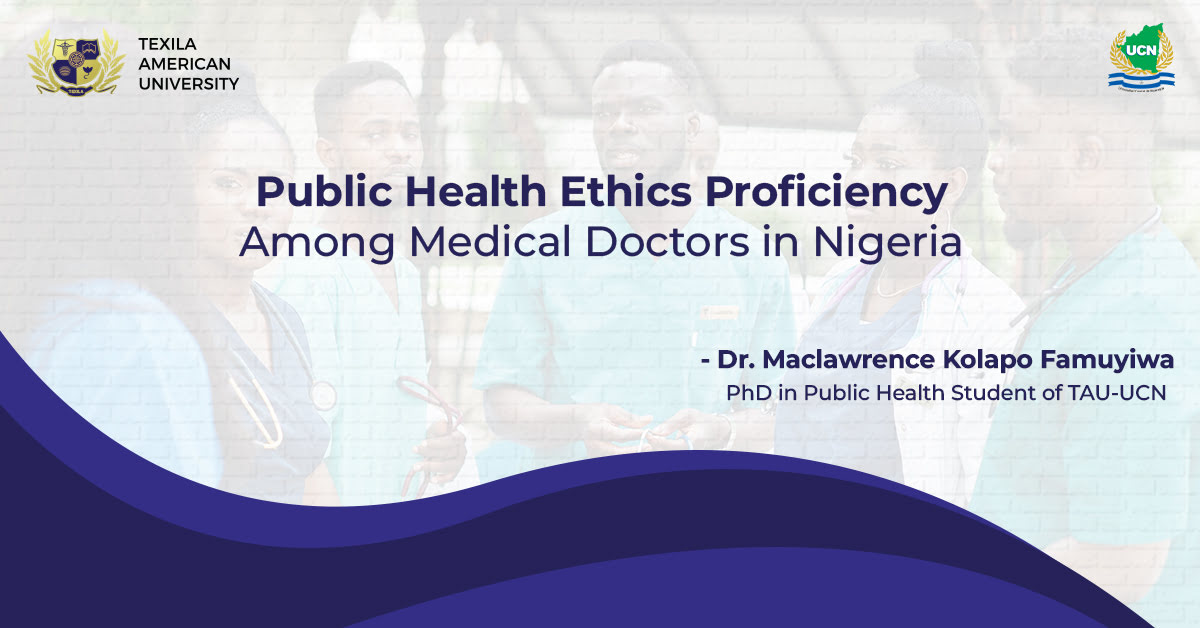Blog Summary
Dr. Maclawrence Kolapo Famuyiwa’s research delves into the proficiency of Nigerian medical doctors in public health ethics, highlighting significant gaps in knowledge and education. His study underscores the need for comprehensive curriculum reforms and continuous ethics training to enhance healthcare delivery. By addressing these deficiencies, Nigeria’s healthcare system can better navigate ethical dilemmas and uphold ethical standards. Join us in exploring the critical role of public health ethics in shaping healthcare practices in Nigeria.
Author Information
Dr. Maclawrence Kolapo Famuyiwa is a dedicated medical professional from Nigeria with expertise in public health ethics. He holds a Bachelor of Medicine and Bachelor of Surgery (MBBS) degree and is currently pursuing a Doctor of Philosophy (PhD) in Public Health as a student of TAU-UCN.
With a keen interest in ethical considerations in healthcare, Dr. Famuyiwa has conducted insightful research focusing on the proficiency of medical doctors in Nigeria regarding public health ethics. His studies aim to contribute to the improvement of healthcare delivery and medical education in Nigeria.
For inquiries or collaborations, Dr Famuyiwa can be reached via email at maclaw196@gmail.com.
Introduction
Dr. Maclawrence Kolapo Famuyiwa, a Nigerian medical professional, delves into Public Health Ethics in this insightful study. Public Health Ethics pertains to the ethical principles guiding actions to improve population health. It holds paramount importance in medical practice, as it directs efforts towards disease prevention, health promotion, and equitable resource allocation.
Dr Famuyiwa’s study aims to assess the proficiency of Nigerian medical doctors in understanding these principles and the existence of national ethical guidelines.
Through this exploration, the study seeks to shed light on the current state of medical ethics education in Nigeria and advocate for necessary reforms. Join us as we delve deeper into Public Health Ethics’ significance in shaping the healthcare delivery landscape.
Understanding Public Health Ethics
Public Health Ethics and Bioethics
Public health ethics and bioethics are intertwined yet distinct fields within the realm of ethical considerations in healthcare. While bioethics primarily focuses on ethical issues concerning individual patients and their healthcare providers, public health ethics zooms out to consider the broader population’s health and well-being.
Fundamental Principles of Public Health Ethics
Public health ethics is guided by several fundamental principles that govern ethical decision-making and actions in the field:
- Beneficence: Striving to promote the greater good and maximize benefits while minimizing harm to the population.
- Non-maleficence: Ensuring that actions do not cause harm to individuals or the community.
- Justice: Fair distribution of resources and opportunities to ensure equitable access to healthcare and public health interventions.
- Respect for autonomy: Acknowledging individuals’ rights to make informed decisions about their health while considering the collective good.
Ethical Considerations
Ethical dilemmas in public health research and practice often involve balancing individual rights with societal well-being. Some common ethical considerations include:
- Informed consent: Ensuring individuals understand the risks and benefits of participating in research or public health interventions.
- Confidentiality: Safeguarding sensitive health information while also maintaining transparency and accountability.
- Resource allocation: Ethical decision-making in distributing limited resources such as vaccines or medical supplies during public health emergencies.
- Community engagement: Involving communities in decision-making to respect their autonomy and cultural values.
The online PhD in Public Health program offered by TAU-UCN provides a comprehensive understanding of fundamental principles and ethical considerations crucial for addressing population health challenges worldwide.
Assessing Medical Doctors’ Knowledge and Education
Methodology of the Study
The study employed a cross-sectional questionnaire-based approach to assess medical doctors’ knowledge and education in public health ethics in a healthcare facility in South-west Nigeria.
Medical Education and Exposure to Public Health Ethics
The findings revealed varying levels of exposure to public health ethics education among medical practitioners, with a median duration of formal education or exposure to public health ethics being 5 hours. While a majority claimed to have had medical ethics as part of their education, there were evident gaps in knowledge, indicating a need for curriculum revision.
Awareness of Ethical Dilemmas in Public Health
Many respondents demonstrated awareness of ethical dilemmas in public health, including end-of-life care, discharge against medical advice, and confidentiality concerns.
Knowledge of Regulatory Bodies in Nigeria
Despite some awareness of regulatory bodies such as the National Health Research Ethics Committee (NHREC), respondents were not familiar with their roles and responsibilities, highlighting the need for improved awareness and education on healthcare regulations and ethics.
Analysis of Findings
Understanding the demographics and knowledge levels of respondents sheds light on the current state of public health ethics education among medical professionals in Nigeria. Here’s a breakdown of the analysis:
Summary of Respondents’ Demographics: The study included medical doctors from various levels of training, with a majority being junior doctors in the 25-34 age range. Male respondents outnumbered females, reflecting trends in medical education in Nigeria.
Knowledge Levels and Awareness: While a significant percentage of respondents claimed exposure to medical ethics education, there were discrepancies in their understanding of public health ethics principles. Many were unaware of regulatory bodies overseeing health research ethics, indicating gaps in knowledge and awareness.
Current State of Medical Education in Nigeria: The findings highlight deficiencies in the existing medical education curriculum, particularly regarding public health ethics. Comprehensive reforms are needed to integrate ethics training at both undergraduate and postgraduate levels.
Implications and Recommendations
The study’s findings significantly affect healthcare delivery and medical education in Nigeria. Here are key takeaways and recommendations:
Public Health Ethics Knowledge: Limited understanding of public health ethics among medical professionals can lead to ethical dilemmas in healthcare practice and research. This compromises patient care, undermines trust in the healthcare system, and may hinder progress in addressing public health challenges.
Recommendations for Improving Medical Education
To address the gaps identified in public health ethics education, policymakers and medical educators should consider the following recommendations:
- Revise the medical education curriculum to include comprehensive training in public health ethics.
- Implement mandatory ethics courses at both undergraduate and postgraduate levels.
- Enhance faculty training and resources for teaching ethics effectively.
Continuing Medical Education in Ethics
Continuous education in ethics is essential to ensure medical professionals stay updated with ethical standards and best practices. Suggestions include:
- Offering certificate courses or higher degrees in medical ethics.
- Providing ongoing training and workshops on ethical dilemmas in healthcare practice.
- Encouraging participation in professional development activities focused on ethics.
By implementing these recommendations, stakeholders can work towards fostering a healthcare environment grounded in ethical principles and ensuring the well-being of both patients and communities.
Conclusion
Dr. Maclawrence Kolapo Famuyiwa’s study on public health ethics proficiency among medical doctors in Nigeria illuminates critical insights into the current landscape of medical ethics education and its implications for healthcare delivery. The findings underscore the urgent need for reforms in medical education to address gaps in understanding public health ethics principles and regulatory frameworks.
By prioritizing comprehensive ethics training at both undergraduate and postgraduate levels and emphasizing continuous ethics education, stakeholders can enhance healthcare professionals’ proficiency in navigating ethical dilemmas and upholding ethical standards in practice and research.
Through collaborative efforts and commitment to ethical excellence, Nigeria’s healthcare system can foster a culture of integrity, trust, and equity, ultimately advancing the well-being of individuals and communities.







